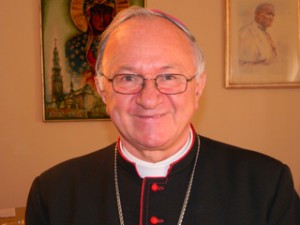 Speech by H.E. Msgr. Zygmunt Zimowski
Speech by H.E. Msgr. Zygmunt Zimowski
on the Occasion of the Pilgrimage of the Pontifical Council for Health Care Workers (for Health Pastoral Care) to Bucchianico
(2 October 2013)
‘Arriving on a pilgrimage at the birthplace of one of the saints of charity who within the Church gave an impulse, together with others down the centuries, to the charism of charity and mercy towards the sick, and also taught with how much lovingness and care the suffering members of Christ must be served, means for the Pontifical Council for Health Care Workers (for Health Pastoral Care) that the commitment to evangelise in this specific area of pastoral care never comes to an end. Indeed, to draw from the historical but still living memory of St. Camillus de Lellis that lymph that made him the initiator of a new nova schola caritatis for health-care workers and for all those who in different capacities bend down in front of their suffering neighbour – family relatives, volunteers, without excluding pastors in various social/care contexts and in their own parishes – constitutes an impulse to increase on the part of this Pontifical Council and those who work in it the effort, which as is of as much contemporary relevance as ever before, to bring the message of mercy and sharing which Christ himself entrusted to his Church.
Furthermore, to go over the historical stages that led St. Camillus to be himself marked, before his conversion and then during the whole of his life, by the mystery of pain, constitutes a call not to limit pastoral action to offering comfort and professional support to sick people but to recognise that they themselves are the creators and protagonists of evangelisation, to which, indeed, the young Camillian, the Venerable Nicola D’Onofrio, who is buried here in the sanctuary of Bucchianico, bore witness.
To immerge ourselves in the roots of the historical experience of the founder of the Regular Clerics Ministers of the Sick – better known as the Camillian religious – means, therefore, to retrieve the originality of the insight that the Church recognised St. Camillus and his religious family as having, and which still today we are called to propose anew, certain that the pathway of mercy towards the sick and the whole social/health-care world, as well as the appreciation of the dignity of the sick or suffering person, constitutes a highway for evangelisation and a reflecting model that brings forth the beauty and the contemporary relevance of the mandate that Jesus gave to his Church – ‘Euntes docete et curate infirmos (Mt 10:6-8) –, as is also borne witness to by the special predilection and paternal nearness of Pope Francis towards this part of the Flock of Christ’.














Camillians on Facebook
Camillians on Twitter
Camillians on Instagram